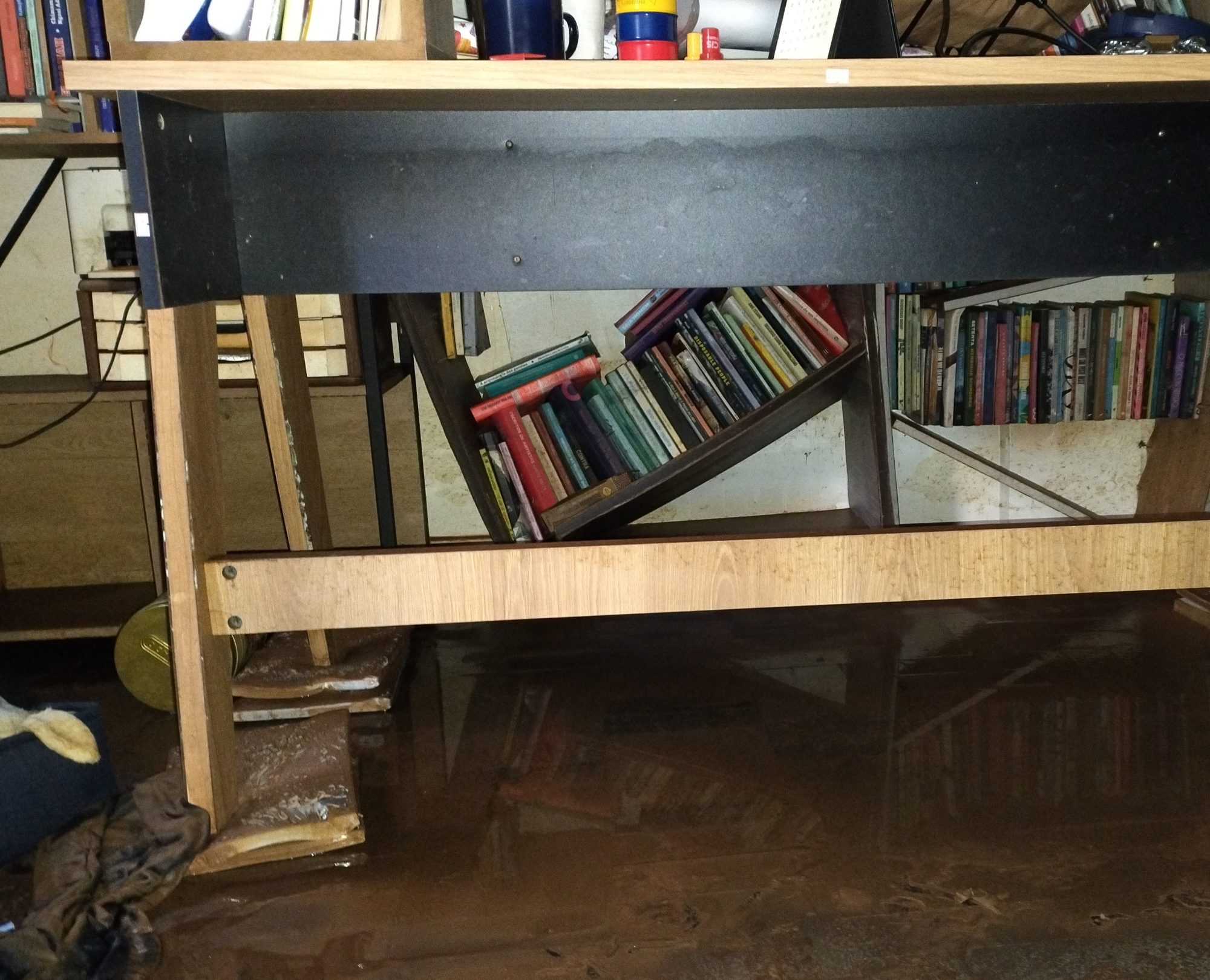Lições de uma casa inundada
Porque a prefeitura escolheu não gastar todo o orçamento previsto para a manutenção do sistema contra cheias, aprendi que a prevenção é uma ilusão, pois quando saímos de casa com água molhando os pés, de modo algum teríamos acreditado que ela chegaria na altura da cintura e que os nossos esforços de elevação da mobília se mostrariam de uma inocência atroz.
Porque não houve investimento nas bombas de drenagem da cidade, eu aprendi que os livros, quando encharcados, incham ao ponto de quebrarem uma estante.
Porque os governantes sucatearam o sistema de água e esgoto para tentar privatizá-lo, eu aprendi que o pior da lama de uma enchente não é o seu cheiro nem seu potencial infeccioso, mas o fato de que ela é grudenta. O pior da lama é o fato de que você precisa usar uma velha escova de dentes para esfregar cada um dos objetos que você tem a esperança de resgatar, sabendo que, mesmo assim, amanhã você vai notar que nas dobradiças da cadeira de praia, no detalhe do seu brinco preferido, nas reentrâncias da escultura que ficava na sua agora desfeita estante de livros, ainda resta um resíduo marrom e malcheiroso.
Porque a mata nativa foi derrubada para dar espaço a plantações de soja e eucaliptos, eu aprendi que o mofo é uma forma de vida insistente, que você pode limpar os seus poucos móveis remanescentes com afinco, mas dois dias depois eles estarão peludos ou esverdeados novamente. E você, que nunca imaginou passar por isso porque o seu bairro não era considerado uma zona de risco, agora se vê alimentando uma série de pensamentos inéditos a respeito do que significa a resiliência – não a sua, mas a dos fungos. Porque não sabe mais onde buscar uma saída, você tem a esperança de poder aprender alguma coisa com eles.
Lehren aus einem überschwemmten Haus
Dadurch, dass die Stadtverwaltung entschieden hat, das für die Erhaltung des Hochwasserschutzsystems vorgesehene Budget nicht vollständig auszugeben, habe ich gelernt, dass Prävention eine Illusion ist, denn als wir das voll Wasser stehende Haus mit nassen Füßen verließen, hätten wir nie gedacht, dass es uns noch bis zur Hüfte gehen würde, und dass unser Bemühen, die Möbel höher zu platzieren totale Naivität bewies.
Dadurch, dass nicht in Entwässerungspumpen für die Stadt investiert wurde, habe ich gelernt, dass Bücher, wenn sie im Wasser stehen, sich derart vollsaugen, dass sie imstande sind, ein Regal zum Einsturz zu bringen.
Dadurch, dass die Regierenden das Wasserversorgungs- und Kanalisationssystem verkommen lassen haben, um zu versuchen es zu privatisieren, habe ich gelernt, dass das Schlimmste bei Schlamm von Hochwasser nicht der Geruch ist oder die Krankheitserreger, sondern seine Klebrigkeit. Das Schlimmste an dem Schlamm ist, dass du eine alte Zahnbürste brauchst, um jeden Gegenstand, von dem du hoffst, dass du ihn noch retten kannst, einzeln damit abzuschrubben, im Wissen, dass du in der Faltung des Strandstuhls, in dem Detail an deinem Lieblingsschmuck, in den Aussparungen an der Skulptur, die auf dem jetzt kaputten Regal stand, morgen schon bemerken wirst, dass da ein bräunlicher, stinkender Rückstand geblieben ist.
Dadurch, dass der Küstenwald abgeholzt wurde, um Sojafeldern und Eukalyptuspflanzungen Platz zu machen, habe ich gelernt, dass Schimmel eine sehr beständige Lebensform ist, denn du kannst deine wenigen übrig gebliebenen Möbel mit dem größten Eifer putzen, und doch werden sie zwei Tage später von neuem grünlich oder pelzig überzogen sein. Und du, die/der du dir nie hast träumen lassen, so etwas durchmachen zu müssen, weil dein Stadtviertel gar nicht in der Gefahrenzone liegt, bist jetzt dabei, dir eine Reihe völlig neuer Gedanken zu machen, nämlich über die Bedeutung von Resilienz – nicht deiner, sondern die der Pilze. Weil du nicht weißt, wo es noch irgendeinen Ausweg geben könnte, hoffst du, dass es von ihnen noch etwas zu lernen gibt.
Übersetzung: Lea Hübner
Lessons From a Flooded House
Because the city council chose not to spend the entire budget set aside to maintain the flood control system, I have learned that prevention is a fallacy. When our feet got wet as we stepped outside our house, never could we have ever imagined that the water would soon be waist-high and that our efforts to raise the furniture off the ground would prove to be atrociously naïve.
Because no investments were made in the city’s drainage pumps, I have learned that books can swell once they are soaked―to the point that they can break a bookshelf.
Because the government had left the water and sewage system for scraps in an effort to privatize it, I have learned that the worst thing about flood mud is not the smell or its potential to cause an infection, but how sticky it is. The worst thing about mud getting everywhere is that you have to use an old toothbrush to scrub each object you hope to restore, all the while knowing that, the next day, you’ll still find traces of brown, smelly mud in the folds of your beach chair, in the details of your favorite earrings, in the crevices of the small sculpture that stood on your now-dismantled bookcase.
Because the native forest was cut down to make room for soy crops and eucalyptus plantations, I learned that mold is a persistent form of life. You can deep-clean the few pieces of furniture you have left, but they’ll be covered in hairy or green mold again two days later.
Because my neighborhood wasn’t considered a risk zone, I had never thought I’d be going through this, but I now find myself entertaining a series of brand new thoughts about the meaning of resilience―not only mine, but that of fungi. Since we don’t know where to look for a way out of this situation, we can only hope to learn something from them.
Translation: Rafa Lombardino
Teilen












